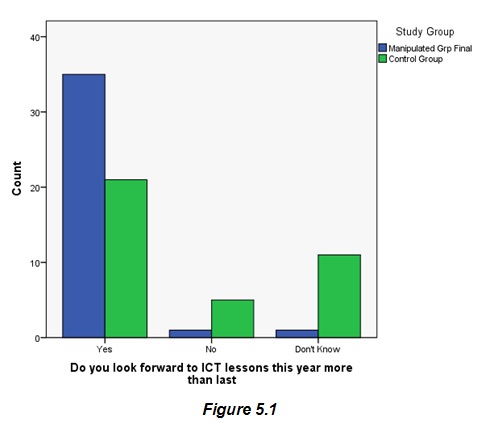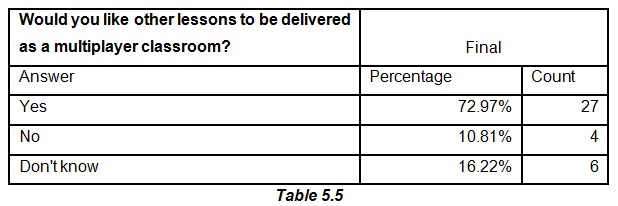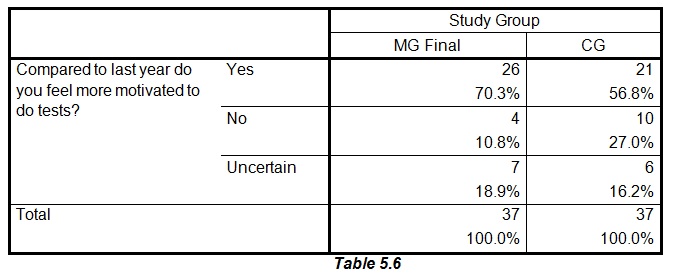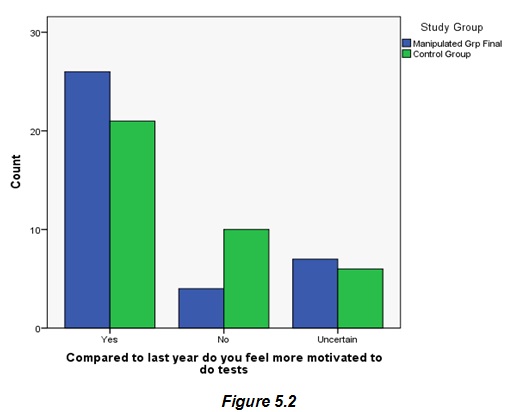Chapter 5 – Enthusiasm and motivation
MG1 seemed enthusiastic from the beginning of the study, and this enthusiasm did not appear to wane (Table 5.1). Some students from MG2 were very keen at the start – one student told me that he had studied the whole website and he knew all the random events and what they meant – but I wondered if some were perhaps ‘going with the flow’; however, as the weeks progressed the level of interest and enthusiasm in MG2 heightened, and I was observing more instances of students persevering with a task, who last year would have given up and ‘played around’ instead. In week9 a different Learning Support Assistant was present with this class; she looked perplexed as to what was going on but commented positively, saying, ‘What a difference this lesson compared to others’.
MMORPGs reward positive actions, keeping players motivated, engaged and committed to the game (Gee, 2007; Ang & Zaphiris, 2010; Chatfield, 2010; McGonigal, 2011; Sheldon, 2012; Wu et al., 2013). On a few occasions students from the MG who had been absent[1] Some absences were due to school outings/events. asked if they could do a missed test/piece of classwork during the break to earn the XP; sometimes the same students would keep checking that it was still okay for them to come during the break. No one from the CG came to catch up on work.
Midway through the study, MG1 and MG2 voted in favour of continuing the multiplayer classroom, and made their point quite vociferously. In the final questionnaire, 33 said they did not want to stop the multiplayer classroom, while 4 were unsure (Table 5.2).
Both MG said that they enjoyed the multiplayer classroom (Table 5.3). The interview groups concurred and unanimously agreed that they preferred their ICT lessons delivered as a multiplayer classroom.
Zidane: You’ll be more excited for the lesson in general. You’re not fed up when you go to the lesson. Pirlo: It’s better than last year.
Both interview groups agreed that they would like their ICT lessons to be delivered this way in the future, “but with a different theme” (Pirlo), “so the story will be different” (Delpiero).
Games fulfil our desire for intrinsic reward; participation in games is its own reward (McGonigal, 2011). In week12 when MG2 asked who was in first place: I reminded them that there would be no prize to which they replied, ‘Not for a prize but it’d be good to know who’s first, second, etc.’ Two weeks later I covered a lesson for another teacher with MG2, and they asked if we could do a lesson of ICT with XP; they were disappointed when I said that their teacher had left work for them to complete. It was encouraging that even this far along in the study they were still enthusiastic about the multiplayer classroom.
Another positive sign in week12 was when two Form 2 students asked me during the break if I would be teaching Form 3 next year; their older brothers were in MG1 and MG2 and they said they were looking forward to ‘playing the game’ too.
There was a significant difference (X2(2,N=74)=14.500, s) between the MG and CG responses. The majority of the MG looked forward to ICT more this year compared to last year, and although 21 in CG responded positively, 11 were uncertain (Table 5.4 and Figure 5.1).
The interviews and questionnaires revealed that most students in the MG would like other lessons to be delivered as a multiplayer classroom (Table 5.5).
Tests and extra work
There was no significant difference (X2(2,N=74)=3.180, ns) between the MG and CGregarding their motivation to do tests; this could be because all groups used the Verdict Plus System[2]http://eu.hitachi-solutions.com/mediaresources/liens/verdictPlus/verdictPlus-Web.pdf remote controls (Figure 5.3) to turn short, end of topic tests into games (using the game feature) which was engaging and popular in all classes (Table 5.6 and Figure 5.2).
Almost half of the students in the MG and CG (Table 5.7 and Figure 5.6) said that they felt more motivated this year to study at home; however, there was a significant difference (X2(2,N=74)=7.365, s) between those students who responded ‘no’ or ‘uncertain’.
Collaboration can take place even when the game is not being played, as students can complete individual tasks that will benefit the team as a whole (Whitton, 2010; McGonigal, 2011). In the questionnaires over half of the MG said that they did the extra work (Table 5.8) Three of the interviewees from MG2 said they did the extra work, while the other interviewee said he did not have time; he said he did not even visit the website. In contrast Delpiero (MG1) said, “I did the online tests and got 95 in the exam!”[3]The half-yearly exams. He said he liked the opportunity to gain XP through the extra tasks, which the other interviewees agreed with. Pirlo added, “You can do it at home or you can come here during the break, which is good.”
From those who answered ‘yes’, there were mixed responses about whether they would have done the extra work without XP (Table 5.9)
Footnotes
| ↑1 | Some absences were due to school outings/events. |
|---|---|
| ↑2 | http://eu.hitachi-solutions.com/mediaresources/liens/verdictPlus/verdictPlus-Web.pdf |
| ↑3 | The half-yearly exams. |












